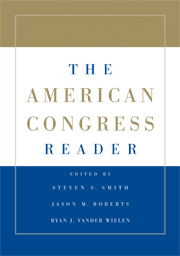Book contents
- Frontmatter
- Contents
- THE AMERICAN CONGRESS READER
- PART I THE AMERICAN CONGRESS: MODERN TRENDS
- PART II REPRESENTATION AND LAWMAKING IN CONGRESS: THE CONSTITUTIONAL AND HISTORICAL CONTEXT
- PART III CONGRESSIONAL ELECTIONS AND POLICY ALIGNMENTS
- PART IV MEMBERS, GOALS, RESOURCES, AND STRATEGIES
- PART V PARTIES AND LEADERS
- PART VI THE STANDING COMMITTEES
- PART VII THE RULES OF THE LEGISLATIVE GAME
- PART VIII THE FLOOR AND VOTING
- PART IX CONGRESS AND THE PRESIDENT
- PART X CONGRESS AND THE COURTS
- PART XI CONGRESS, LOBBYISTS, AND INTEREST GROUPS
- PART XII CONGRESS AND BUDGET POLITICS
- 38 Appropriations in the Republican Era
- 39 Pet Projects' Veil Is Only Partly Lifted
- PART XIII FURTHER READINGS ON CONGRESSIONAL POLITICS
39 - Pet Projects' Veil Is Only Partly Lifted
Lawmakers Find Other Paths to Special-Interest Funding
Published online by Cambridge University Press: 05 June 2012
- Frontmatter
- Contents
- THE AMERICAN CONGRESS READER
- PART I THE AMERICAN CONGRESS: MODERN TRENDS
- PART II REPRESENTATION AND LAWMAKING IN CONGRESS: THE CONSTITUTIONAL AND HISTORICAL CONTEXT
- PART III CONGRESSIONAL ELECTIONS AND POLICY ALIGNMENTS
- PART IV MEMBERS, GOALS, RESOURCES, AND STRATEGIES
- PART V PARTIES AND LEADERS
- PART VI THE STANDING COMMITTEES
- PART VII THE RULES OF THE LEGISLATIVE GAME
- PART VIII THE FLOOR AND VOTING
- PART IX CONGRESS AND THE PRESIDENT
- PART X CONGRESS AND THE COURTS
- PART XI CONGRESS, LOBBYISTS, AND INTEREST GROUPS
- PART XII CONGRESS AND BUDGET POLITICS
- 38 Appropriations in the Republican Era
- 39 Pet Projects' Veil Is Only Partly Lifted
- PART XIII FURTHER READINGS ON CONGRESSIONAL POLITICS
Summary
Earmarking – designating money for specific projects in bills or committee reports – was made more transparent by new rules adopted in 2007. Washington Post writers Solomon and Birnbaum report on legislators' continuing practice of lobbying executive agencies on behalf of projects to be built in their districts and states. When the lobbying originates with legislators whose support is critical to an agency, the pressure on the agency is considerable and, at least in appearance, circumvents the new rules. Agencies that yield to the pressure gain no additional budget, at least not immediately, but they reduce the funding available for other projects and activities while complying with the wishes of important legislators.
Rep. Rahm Emanuel was extremely proud when the House passed a major spending bill early this year that contained not a single special-interest project. “This is an earmark-free bill,” the Illinois Democrat jubilantly declared on Feb. 1.
A week later, however, he and 18 other Illinois lawmakers signed a letter to the Energy Department to “express our strong support” for a bio-energy project at the University of Illinois. Emanuel also sent his own letter to the department seeking “support and assistance in securing” $500,000 for Children's Memorial Hospital in Chicago and $750,000 for the Illinois Institute of Technology.
Such requests for specific institutions are commonly known as earmarks. But Emanuel, a member of the Democratic House leadership, declines to call them that. “Letter-writing is not an earmark,” he said in an interview.
- Type
- Chapter
- Information
- The American Congress Reader , pp. 436 - 438Publisher: Cambridge University PressPrint publication year: 2008

